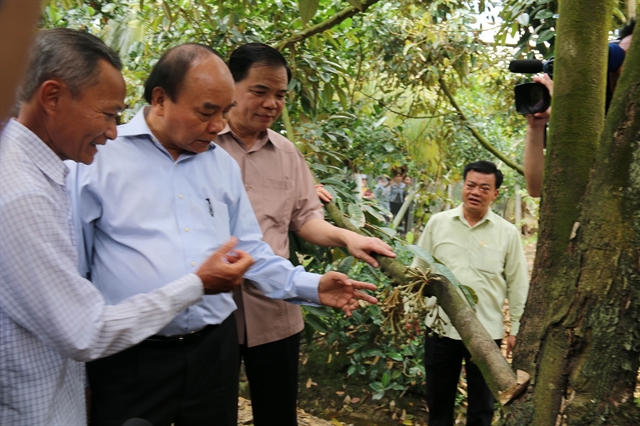 Society
Society


|
| Prime Minister Nguyễn Xuân Phúc paid a visit to a durian orchard in the Mekong Delta Province of Tiền Giang. — VNA/VNS Photo Hữu Chí |
TIỀN GIANG — Salt intrusion and drought in the Mekong Delta are now “inevitable” and people should learn to not only co-habit with these phenomena but also to take advantage of them.
Prime Minister Nguyễn Xuân Phúc made the remarks on Wednesday during a meeting on the two pressing issues with the leadership of 13 localities in the Mekong Delta, the most ecologically productive region in Việt Nam but has increasingly faced threats from climate change and unsustainable practices.
“From these threats opportunities can also arise if we can successfully adapt to the situation and take advantage of them,” PM Phúc said, asking that local leadership need to enhance their understanding and awareness on this problem.
According to the Ministry of Agriculture and Rural Development, salt intrusion during the dry season in early 2021 could affect winter-spring rice crops especially in coastal localities. The total rice area affected by salt intrusion could be around 5.3-6.1 per cent, while 14-23 per cent of fruit growing areas would be impacted.
Up to 70,600 households may be lacking freshwater in the period, the ministry’s report noted.
Just in the last five years, the Mekong Delta has witnessed two record salt intrusion periods during the 2015-16 and 2019-20 dry seasons, and with dropping rainfall and diminished flow from upstream to the delta, the salt intrusion is forecast to be at “high to serious level” in the upcoming dry season.
Stressing that every effort must be expended to make sure that households in the Mekong region won’t have to suffer from lack of clean freshwater to use in their daily life, the Government leader urged for more measures to store larger amount of freshwater in a “proactive” manner at all levels, besides crafting plans to immediately relieve not only people’s needs but also water for crops, fruit orchards, and livestock in emergency situations.
PM Phúc said it is necessary to ensure uninterrupted production and exports of the region’s key agricultural products such as fruits, rice, and shrimp.
Regarding specific tasks and measures, the Vietnamese Government leader suggested focusing on communicating well the information on risks of salt intrusion and drought during the Mekong’s dry season to each family and community in the region so that people can proactively take appropriate response measures.
Prevention and control efforts of drought and saltwater intrusion must be based on the "four on-site” principles – on-site leadership, humans, resources, and logistics – starting "from the people, from the local level" similar to prevention efforts of natural diseases in general, PM Phúc said.
Regular monitoring of water resources and reliable forecasts are urged so that localities can make informed responses.
PM Phúc asked the agriculture ministry to craft revisions on agriculture planning in line with the available and forecasted water conditions, guide localities in switching crops or changing production time of crops to minimise the impacts of salt intrusion and drought.
Farmers should take heed of local authorities and only grow rice in areas where irrigation water is ensured to avoid losses, he noted.
PM Phúc ordered the agriculture ministry and local governments to expedite irrigation and water supply projects.
The health ministry is tasked with providing guidelines to the people on the right way to store and treat water to avoid diseases.
Regarding long-term tasks, PM Phúc demanded more robust solutions, especially hi-tech and digital solutions, in the prevention and control of salt intrusion.
He asked the Mekong River Commission of Việt Nam to accelerate assessment of the impacts of upstream hydropower plants along with increased water use in the upper Mekong countries, to the Mekong Delta, so that the country can have appropriate responses.
Earlier in the morning, accompanied by the agriculture ministry and Tiền Giang leaders, PM Phúc visited a durian orchard, considered an exemplary agriculture model.
Mai Văn Âu, owner of the orchard, said that before worsening salt intrusion, he harvested some 20-25 tonnes of durian per hectare, and each involved household could earn some VNĐ1.1 billion in profits.
He asked that the Government continue to invest in embankments and anti-salinity dyke systems for the Mekong region, especially a freshwater irrigation system for his hometown Cai Lậy Commune, which possesses 10,000ha of durian orchards out of the country’s total 22,000ha.
This is the second time the Government leader paid a working trip on salt intrusion to Tiền Giang within a year, agriculture minister Nguyễn Xuân Cường said, adding that the ministry plans to work with Tiền Giang to turn it into Việt Nam’s specialty durian production zone.
PM Phúc commended Mai Văn Âu’s model and suggested that other households should learn from his crop switching experience, adding that aside from the Government’s mitigation efforts, he hoped the people in the delta would be united, creative and determined to overcome natural calamities. — VNS




